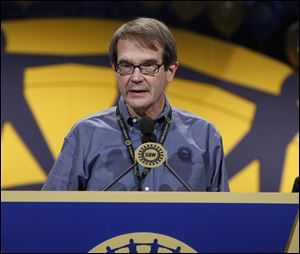
UAW to seek early pacts with 3 U.S. automakers
4/21/2011
UAW President Bob King is said to favor an early pact with GM to head off an attempt by Ford to gain concessions.
DETROIT -- The United Auto Workers will seek early contract settlements in talks with the U.S. automakers this year, breaking a pattern of brinksmanship that stretches at least four decades, two people familiar with the plan said.
UAW Vice President Joe Ashton, who leads bargaining with GM, has said the union wants a deal before the current four-year pact with General Motors Co., Ford Motor Co., and Chrysler Group LLC expires on Sept. 14, said the people, who asked not to be identified revealing internal discussions. The union may seek a deal with GM first, one person said.
UAW President Bob King favors an early pact at GM to prevent an attempt by Ford to gain concessions workers at GM and Chrysler granted before the firms went bankrupt in 2009, the person said. Ford, which avoided bankruptcy and earned $6.6 billion last year, is the only U.S. automaker whose workers refused to accept limits on strikes over wages and benefits.
"Bob will go to GM first because he couldn't take a rich Ford agreement to GM and Chrysler," said Sean McAlinden, chief economist with the Center for Automotive Research in Ann Arbor. "It would be almost impossible to sell a Ford agreement to GM and Chrysler."
Michele Martin, a UAW spokesman, didn't respond to a request for comment.
The UAW traditionally targets a lead automaker to set a pattern for wages and benefits that the union then seeks to impose on the other two companies, Mr. McAlinden said. Typically, bargaining goes up to or beyond the contract deadline before a deal is reached, he said. In 2007, GM and Chrysler had short strikes before an agreement was reached. Ford hasn't had a national strike since 1977.
"If Chrysler or GM were the target, then the pattern agreement would be cheaper for Ford," said Mr. McAlinden, a former autoworker. "GM wants to do it and they are claiming they are the middle-of-the-road company."
Jodi Tinson, a Chrysler spokesman, and Kim Carpenter, a spokesman for GM, declined to comment.
"The decision about which company will lead the negotiations with the UAW is up to the UAW leadership," Marcey Evans, a Ford spokesman, said in an interview. "We look forward to our discussions later this year to ensure Ford becomes competitive with the best in the world."
Mr. King, 64, elected president of the union in June, has said workers must be rewarded for the $7,000 to $30,000 in concessions they each gave since 2005 to help the automakers survive. The workers surrendered raises, bonuses, and cost-of-living adjustments and agreed to a two-tier wage system in which new hires make about $14 an hour, half of the amount paid to senior production workers.
The concessions helped the automakers lower labor costs to about $58 an hour for wages and benefits from about $75 and to get close to the $52 Toyota Motor Corp. gives its U.S. workers, Mr. McAlinden said. Labor rates at U.S. automakers remain above the $44 to $48 hourly rate Hyundai pays its U.S. workers in wages and benefits, Mr. McAlinden said.